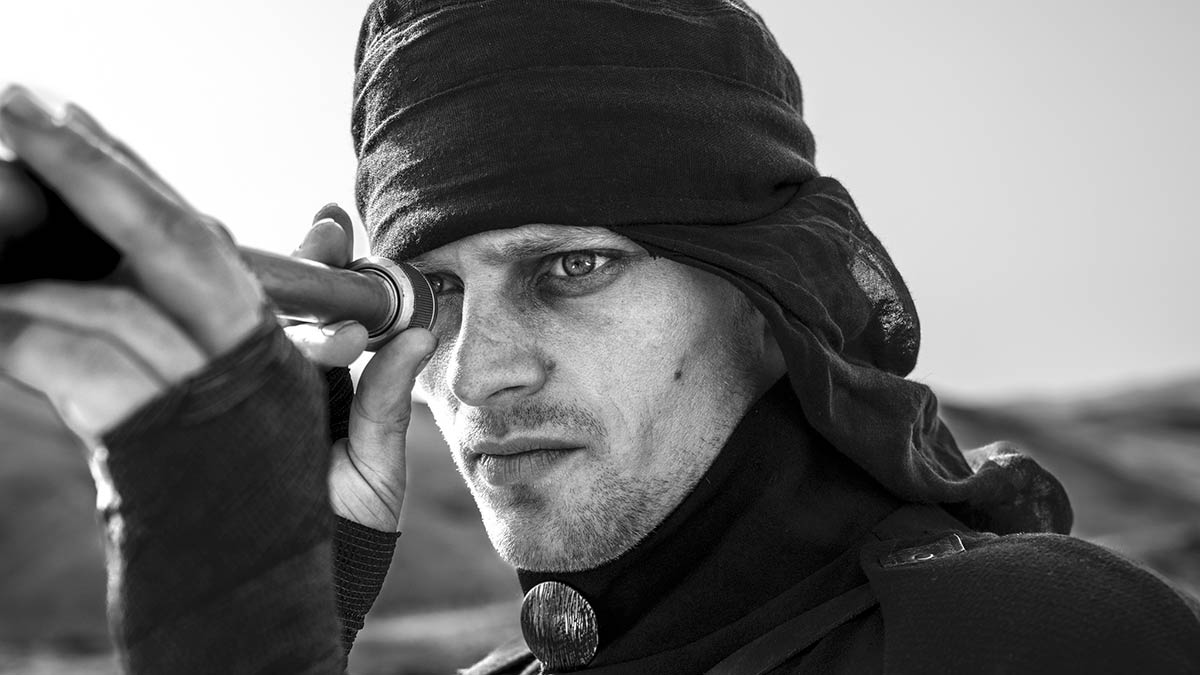
Jessica Woodworth Crafts a Carnally Sublime World Of Men, Power & Desire [IFF Rotterdam Review]
Feb 13, 2023
After films like “Khadak,” “La Cinquième Saison,” and most recently, “The Barefoot Emperor” (all co-directed with Peter Brosens), Belgian-American filmmaker Jessica Woodworth goes solo with the black and white festival gem “Luka,” which premiered as part of Rotterdam’s Big Screen Competition. In a co-production between Armenia, Belgium, Italy, and Bulgaria, the film is delightfully angsty and bursting with desire: for power, togetherness, and a world at its breaking point.
“Luka” opens with a supple confessional tone as a voiceover admits he “was born for battle.” Poetically, he narrates a farewell letter to his mother: “When you read this, I will be long gone.” And gone he is since the film’s establishing shot is wide enough to have his tiny human figure sucked into the grandiosity of nature, its deserts, and its desolate landscapes. But it is because of the soothing, prayer-like ring to that voiceover, not the stunning vistas, that “Luka” feels bizarre and welcoming simultaneously. The namesake protagonist (Jonas Smulders) traverses deserts and climbs mountaintops in order to serve at Fort Kairos as a guard of this liminal outpost against impending attacks from the North. His desire to fight has led this young, skilled sniper far away from his home and to a rather peculiar posting where discipline is an uncanny law, and almost everyone seems to work maintenance, while a lucky few—called Hawks—are on guard duty, perched atop the wall on constant lookout. Everyone answers to the merciless General (Geraldine Chaplin) and her council, but primarily to her stern gaze.
Fort Kairos and the beckoning North might sound familiar to anyone who’s read Italian author Dino Buzzati’s 1940 novel “The Tartar Steppe,” where a young man spends his life waiting for war at a secluded border outpost. Indeed, Jessica Woodworth adapts Buzzati in a contemporaneous way making the fort an abandoned unfinished dam in Sicily and introducing a protagonist who is barely in the book. “Luka” may borrow tone and topos from its written predecessor, but the film stands on its own two feet regardless. Even more, Woodworth is infinitely more generous to the audience than the novel ever was in the ways in which her script breathes life and luminosity into the conscripts themselves. She crafts a male-dominated world of fantasmatic intimacy to counter military bleakness—a dynamic in which Buzzati himself was never that invested in.
Life at the fortress is a jumble of paradoxes: on the one hand, it is ruthlessly disciplined by harsh reprimands for any misdemeanor—piss-pot duty, shoving excrements, or the worst of it all, the so-called “ghosting” where one is left to die of thirst and starvation underground. On the other hand, the strictly supervised order disintegrates once the commanders are no longer in sight. That’s why every night, all of the recruits gather together to play out the fighting duties they are being denied at Kairos. In these mesmeric sequences, the camera cannot contain the sheer excitement of orchestrating mock fights by itself. Ritualistic and feral, the men all growl and snarl at each other before, during, and after their bodies intertwine in intimacies suggested by Claire Denis in her emblematic “Beau Travail.” However, in “Luka,” these men are not afraid to touch and be touched in return.
The film is at once spectacular and movingly intimate: its intensity channeled through a tight, closely lensed cinematography by DoP Virginie Surdej, whose camera washes over faces, eyes, and fine lines with a mobile, ever-so-curious swish. Swapping wide shots of the Etna volcano on for confining portrait close-ups intensifies the visual experience of “Luka” to the point in which it becomes carnally sublime. In addition, the black and white super 16 mm film transforms skin, shadows, and crevices into abysmal spots of darkness, while the fairly lit bodies themselves are incandescent. Even with all this attention to faces, these men remain impenetrable but willing.
It’s extraordinary how seamlessly Woodworth and Surdej seem to have transformed the enclosed male spaces of the Fort (“short on water, wine, women, and war”) into a beautiful, pulsating world entrapped only by the rigidity of power hierarchies. As the one woman of the cast, Geraldine Chaplin is illustrious as The General (a role which was initially male), and her exacting commands and severe punishments exemplify that very stiffness of human hierarchies which suffocates love and mutual care under the banner of virtues like obedience, endurance, and sacrifice. Even so, Chaplin inhabits the role with just the right amount of subtlety to hint at her character’s vulnerability. The bow she carries as if a saber also testifies to the complex ethical conundrums making up every one of these multifaceted characters.
As for Luka himself, his defining characteristic is due to the idiosyncrasy of Smulders’ pronouncedly physical acting. His stature and the ways in which he settles into different power roles during the film—from newbie to laughing stock, to promoted Hawk, to punished Ghost—show both tenderness and persistence. Together with fellows Geronimo (Django Schrevens) and Konstantin (Samvel Tadevossian) and their shared joy in the prospect of imminent war, Luka finds his footing as a born fighter, even without the battle.
While the film’s narrative can feel more circular than linear, it reinvents itself more vigorously with every turn. By foregoing the usual tropes of coming-of-age stories, Woodworth proves herself once again as a master in the art of storytelling and, more so, of feeling-telling. “Luka” is bewitching, and—of course—due credit goes to the charismatic cast whose synergy animates all these barren locations, but its magnetic qualities have more to do with how it channels pure desires, unburdened by binaries such as male-female, center-periphery, high-low. In “Luka,” both the yearning and the discipline come from the same place: the human, all-too-human need to connect. [A]
Publisher: Source link
TV Shows That Got Canceled In 2024
TV Shows That Got Canceled In 2024 Which 2024 canceled TV show will you miss the most? Share your pick in the comments! Disclaimer: This story is auto-aggregated by a computer program and has not been created or edited by…
Dec 22, 2024
How The Talk Emotionally Ended After 15 Years
The Talk has officially said "Goodbye." After 15 seasons and 2,993 episodes, the CBS daytime show came to an end on Dec. 20 with a heartfelt farewell from hosts Akbar Gbajabiamila, Amanda Kloots, Natalie Morales, Jerry O'Connell and Sheryl Underwood. The episode began with a standing ovation for the…
Dec 22, 2024
Jennifer Lopez Asked About Turning 60, Age
Jennifer Lopez Asked About Turning 60, Age Never ask a woman her age, a man his salary, or Jennifer Lopez how she feels about turning 60. On Sunday, the actor was interviewed by Variety amid the release of her new…
Dec 21, 2024
Lala Kent Shares Text With Ally Lewber After James Kennedy’s Arrest
The BCU (Bravo Cinematic Universe) was shaken on March 3, 2023, when it was confirmed that Tom and Ariana had ended their nine-year relationship amid the revelation that he'd had a seven-month affair with Raquel. "I made mistakes, I was…
Dec 21, 2024











